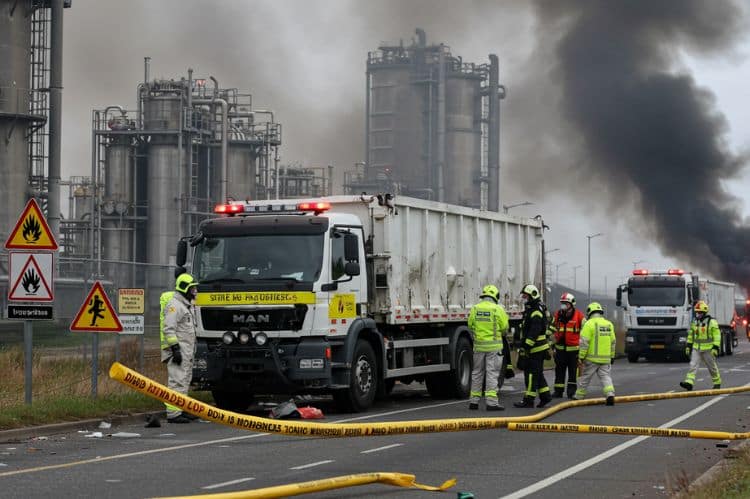When a massive commercial truck collides with a passenger vehicle, the consequences are dramatically different from a standard car-to-car accident. These incidents represent far more than just a difference in vehicle size—they involve complex legal, medical, and investigative challenges that set them apart from ordinary traffic collisions.
Understanding these critical distinctions can be crucial for anyone who shares the road with commercial vehicles or finds themselves involved in such a traumatic event.
Physical and Medical Impact
The most immediate and apparent difference is the sheer physical disparity between trucks and passenger vehicles. A fully loaded commercial truck can weigh up to 80,000 pounds, compared to the average passenger car weighing around 4,000 pounds.
This massive weight difference means that the physics of a collision are fundamentally different. Where a car accident might result in dented panels and minor injuries, a truck accident can instantaneously transform a vehicle into a crushed shell, with devastating consequences for its occupants.
Coffey McPharlin truck accident lawyers concur: “Injuries in truck accidents tend to be exponentially more severe. The tremendous force generated by a large commercial vehicle creates catastrophic trauma that goes far beyond typical car crash injuries. Victims often experience multiple fractures, severe internal injuries, traumatic brain injuries, and spinal cord damage.”
The likelihood of fatality is much higher in truck accidents, with statistics showing that occupants of passenger vehicles are far more likely to be killed when a truck is involved in a collision.
Legal and Investigative Complexities
The legal landscape surrounding truck accidents is significantly more complex than standard car accident claims. Commercial trucks are regulated by federal and state transportation authorities, creating a web of potential liability that extends far beyond the individual driver.
Trucking companies, vehicle manufacturers, cargo loading teams, and maintenance providers might all share responsibility in an accident. This means that determining fault requires a much more extensive investigation compared to a typical two-vehicle collision.
Insurance dynamics also differ substantially in truck accident cases. Commercial trucking companies carry much larger insurance policies, often ranging from $750,000 to several million dollars.
These policies are designed to cover potential massive damages, but they also attract more aggressive legal representation from insurance companies seeking to minimize their financial exposure. Victims often find themselves navigating a much more complicated claims process with highly sophisticated legal teams working to protect the trucking company’s interests.
The investigation of a truck accident involves unique technical considerations. Commercial trucks are equipped with electronic logging devices and onboard computer systems that record critical data about the vehicle’s operation. These digital records can provide precise information about speed, braking, driving hours, and mechanical conditions leading up to an accident.
Specialized forensic experts are often required to analyze this complex data, which goes far beyond the simple eyewitness accounts and physical evidence typical in car accident investigations.
Driver qualifications and behaviors represent another critical distinction. Commercial truck drivers must meet stringent federal licensing requirements, undergo regular medical examinations, and adhere to strict driving hour limitations.
Violations of these regulations can immediately shift liability from the driver to the trucking company. Factors like driver fatigue, improper loading, mechanical failures, and inadequate maintenance become crucial investigative elements that rarely come into play in standard car accident cases.
Broader Consequences and Long-Term Effects

The potential for hazardous cargo adds another layer of complexity to truck accidents. Many commercial trucks transport dangerous materials, including flammable liquids, toxic chemicals, and explosive substances.
An accident involving such cargo can create environmental hazards, secondary explosions, and long-term health risks that extend far beyond the immediate collision site. Emergency responders must approach these scenes with specialized training and equipment not necessary in typical car accidents.
Economic damages in truck accident cases are typically much more substantial. The severe injuries often result in long-term or permanent disability, requiring extensive medical treatment, rehabilitation, and potential lifetime care.
Lost wages, diminished earning capacity, and profound life alterations become central components of damage calculations. The financial stakes are dramatically higher, which means the legal and insurance battles are correspondingly more intense.
Proving negligence in a truck accident requires a more nuanced approach. Investigators must examine maintenance logs, driver training records, company safety protocols, and a range of systemic factors that might have contributed to the accident. This differs significantly from car accidents, which typically focus more narrowly on the immediate actions of the drivers involved.
Prevention strategies also diverge between truck and car accidents. While defensive driving techniques apply to all vehicles, protecting oneself from potential truck accidents requires specific awareness. Understanding a truck’s significant blind spots, recognizing the extended stopping distances required by large vehicles, and maintaining a safe distance become critical survival strategies for passenger vehicle drivers.
The psychological impact of truck accidents can be particularly profound. The traumatic nature of these collisions, combined with their potentially life-altering consequences, creates a unique form of emotional and mental stress. Survivors often experience more intense post-traumatic responses compared to those involved in standard car accidents, necessitating specialized medical and psychological support.
As our highways continue to be critical arteries of commerce, understanding the nuanced differences between truck and car accidents becomes increasingly important. These are not merely larger versions of the same event, but fundamentally distinct types of incidents with their own complex legal, medical, and investigative landscapes. For anyone sharing the road, awareness and caution can mean the difference between safety and catastrophe.
Read Next: How to Pull Together Effective Evidence after a Car Accident